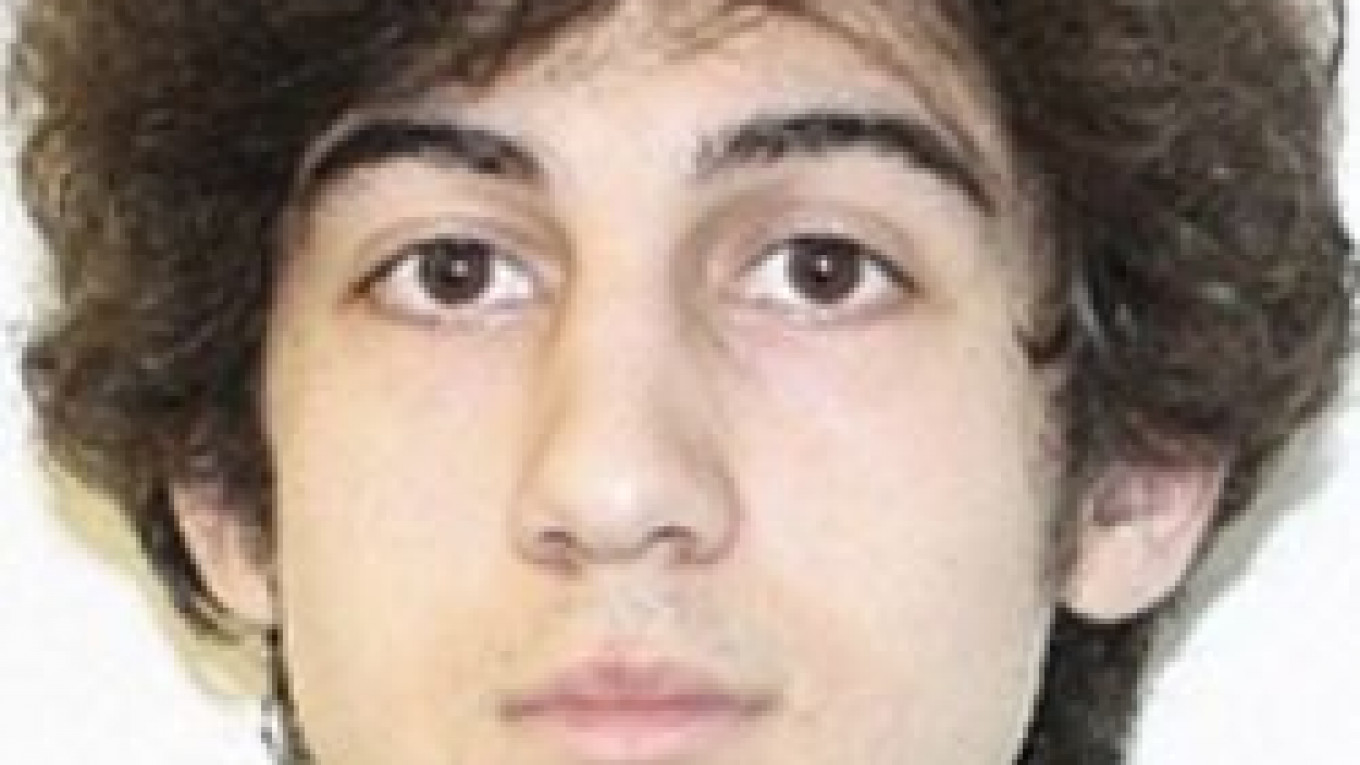BOSTON — The two brothers suspected of bombing the Boston Marathon appear to have been motivated by a radical brand of Islam but do not seem connected to any Muslim terrorist groups, U.S. officials said Monday after interrogating and charging Dzhokhar Tsarnaev with crimes that could bring the death penalty.
Tsarnaev, 19, was charged in his hospital room, where he was in serious condition with a gunshot wound to the throat and other injuries suffered during his attempted getaway. His older brother, Tamerlan, 26, died Friday after a fierce gun battle with police.
The Massachusetts university student was charged with using and conspiring to use a weapon of mass destruction. He was accused of joining with his brother in setting off the shrapnel-packed pressure-cooker bombs that killed three people and wounded more than 200 a week ago.
The brothers, ethnic Chechens from Russia who had been living in the U.S. for about a decade, practiced Islam.
Two U.S. officials said preliminary evidence from the younger man's interrogation suggests the brothers were motivated by religious extremism but were apparently not involved with Islamic terrorist organizations.
Dzhokhar communicated with his interrogators in writing, precluding the type of back-and-forth exchanges often crucial to establishing key facts, said the officials, who spoke on condition of anonymity because they were not authorized to discuss the investigation publicly.
They cautioned that they were still trying to verify what they were told by Tsarnaev and were looking at such things as his telephone and online communications and his associations with others.
In the criminal complaint outlining the allegations, investigators said Tsarnaev and his brother each placed a knapsack containing a bomb in the crowd near the finish line of the world's most prestigious marathon.
The criminal complaint shed no light on the motive for the attack.
The Obama administration said it had no choice but to prosecute Dzhokhar Tsarnaev in the federal court system. Some politicians had suggested he be tried as an enemy combatant in front of a military tribunal, where defendants are denied some of the usual constitutional protections.
But Tsarnaev is a naturalized U.S. citizen, and under U.S. law, American citizens cannot be tried by military tribunals, White House spokesman Jay Carney said. Carney said that since Sept. 11, 2001, the federal court system has been used to convict and imprison hundreds of terrorists.
Also on Monday, Kazakhstan's Ministry of Foreign Affairs issued a statement saying two foreign nationals arrested Saturday in the Boston area on immigration violations are from Kazakhstan and may have known the two Marathon bombing suspects.
The foreign ministry said U.S. authorities came across them while searching for "possible links and contacts" to Dzhokhar Tsarnaev. Their names have not been released.
Dzhokhar Tsarnaev had gunshot wounds to the head, neck, legs and hands when he was captured hiding out in a boat in a backyard in the Boston suburb of Watertown, authorities said.
A probable cause hearing — at which prosecutors will spell out the basics of their case — was set for May 30. According to a clerk's notes of Monday's proceedings in the hospital, U.S. Magistrate Judge Marianne Bowler indicated she was satisfied that Tsarnaev was "alert and able to respond to the charges."
Tsarnaev did not speak during the proceeding, except to answer "no" when he was asked if he could afford his own lawyer, according to the notes. He nodded when asked if he was able to answer some questions and whether he understood his rights as explained to him by the judge.
Federal Public Defender Miriam Conrad, whose office has been assigned to represent Tsarnaev, declined to comment.
Tsarnaev could also face state charges in the slaying of a Massachusetts Institute of Technology police officer, who was shot in his cruiser Thursday night on the MIT campus in Cambridge.
The FBI said it searched Tsarnaev's dorm room at the University of Massachusetts-Dartmouth on Sunday and found BBs as well as a white hat and dark jacket that look like those worn by one of the suspected bombers in the surveillance photos the agency released a few days after the attack, according to the affidavit.
The document included a chilling detail of the suspects' flight from Cambridge: one of the brothers — it wasn't clear which one — told a carjacking victim during their getaway attempt, "Did you hear about the Boston explosion? I did that."
A Message from The Moscow Times:
Dear readers,
We are facing unprecedented challenges. Russia's Prosecutor General's Office has designated The Moscow Times as an "undesirable" organization, criminalizing our work and putting our staff at risk of prosecution. This follows our earlier unjust labeling as a "foreign agent."
These actions are direct attempts to silence independent journalism in Russia. The authorities claim our work "discredits the decisions of the Russian leadership." We see things differently: we strive to provide accurate, unbiased reporting on Russia.
We, the journalists of The Moscow Times, refuse to be silenced. But to continue our work, we need your help.
Your support, no matter how small, makes a world of difference. If you can, please support us monthly starting from just $2. It's quick to set up, and every contribution makes a significant impact.
By supporting The Moscow Times, you're defending open, independent journalism in the face of repression. Thank you for standing with us.
Remind me later.






